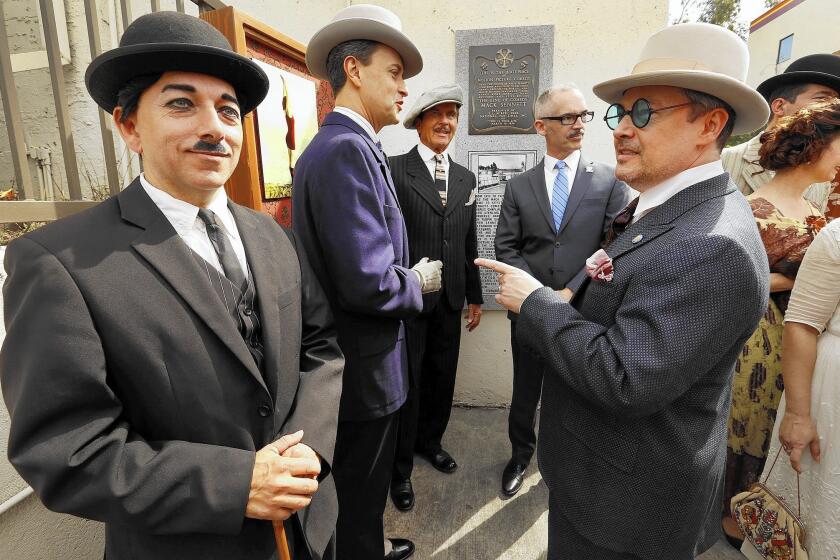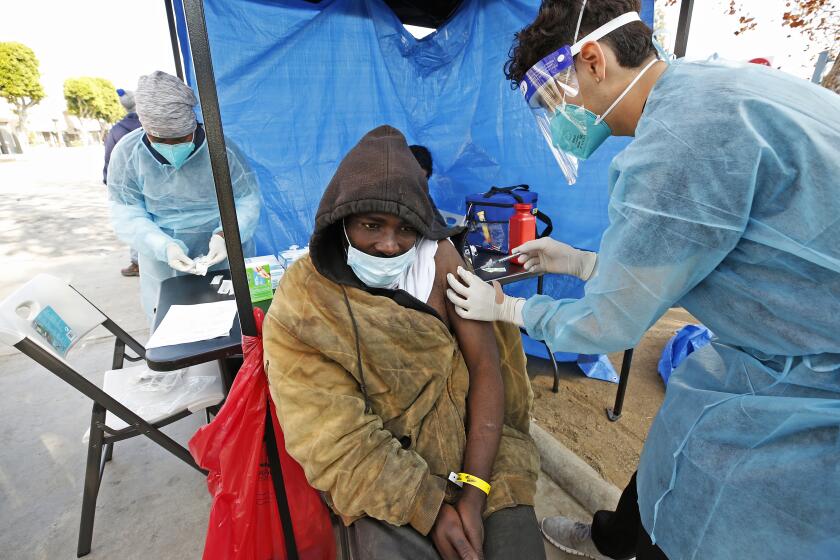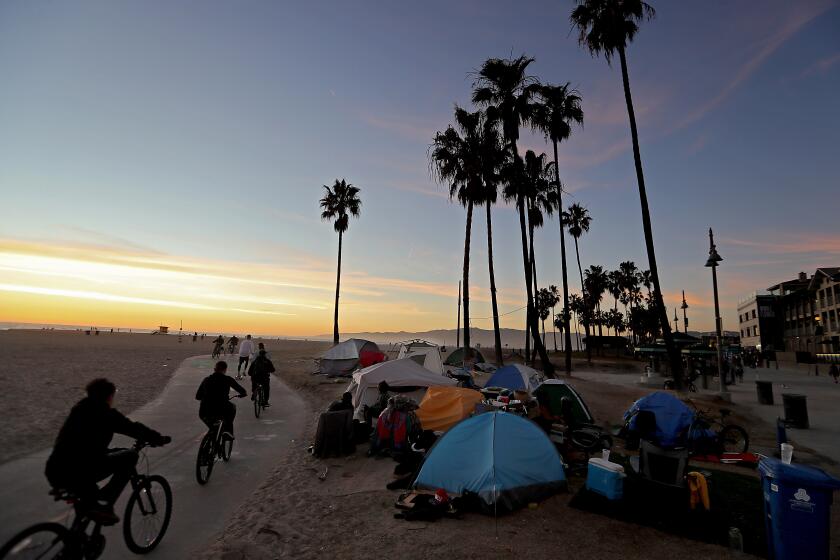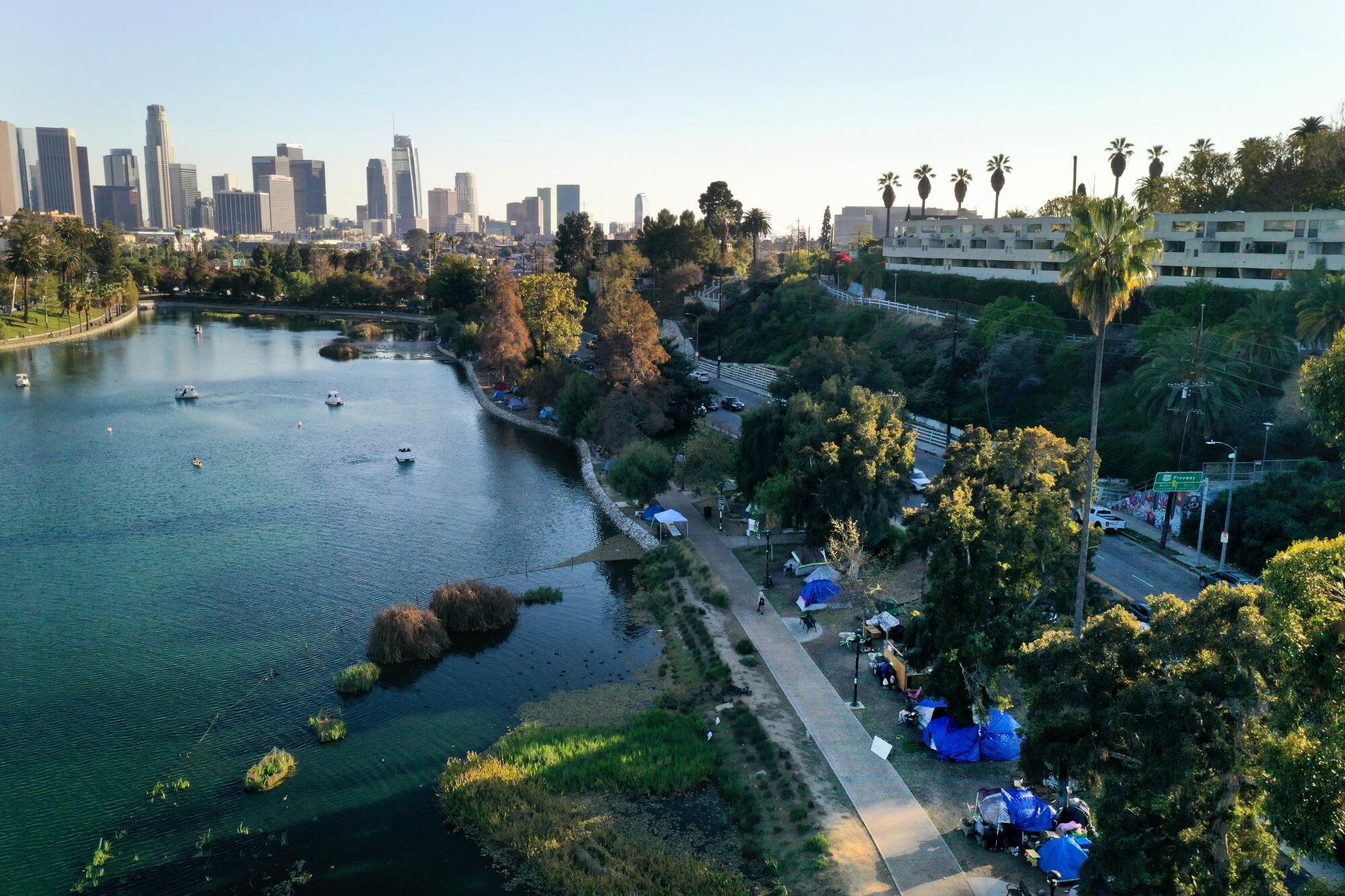
- Share via
It began with a few tents pitched on the grassy rise on the banks of an L.A. landmark, Echo Park Lake.
Then, last year, more homeless people set up camp. By latest count, 174 tents or makeshift structures were bunched at the north end of the lake and spread along its western shore.
For the record:
11:34 a.m. March 15, 2021This article incorrectly states that Riley Montgomery came to Jed Parriott’s home in January 2021. It was in October 2020.
Cupped by an intimate valley of historic homes that opens to a view of the downtown skyline, this photogenic spot has become a symbolically fraught case study of the conflicts rising in neighborhoods across Los Angeles over the rights to public spaces and the competing interests of the housed and unhoused.
No longer just a collection of tents, the encampment has evolved into a commune-like society with a shared pantry, a garden, a veneer of self-policing and a tenuous grasp on basic sanitation. It has fixated both advocates and detractors, who berate each other at public meetings and plead their cases on YouTube.
A seething faction of nearby residents, complaining of drug use, crime and mounds of detritus, have garnered more than 4,000 signatures on an online petition asking the city to remove the camp.
“WE — THE CITIZENS OF ECHO PARK — WILL NO LONGER TOLERATE OUR LAKE BEING DESTROYED!” it said.
Homeless advocates defend the camp as a legitimate exercise of the right of people who have nothing and are trying to make their lives better by living near bathrooms and water fountains. They also have stepped in to provide aid — in a way that they contend the city and homeless services providers do not.
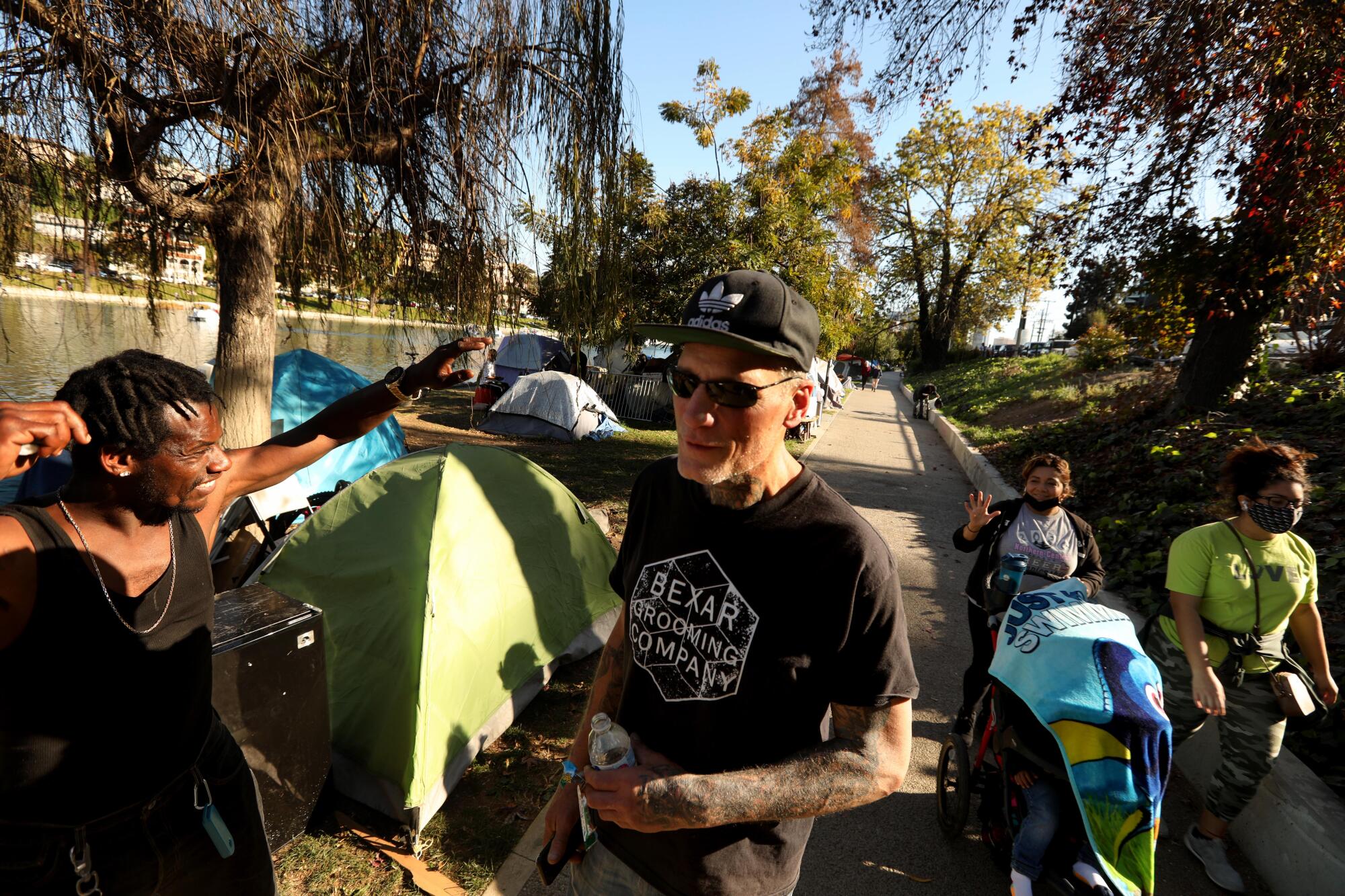
“You can’t just kick us out,” said Jed Parriott, an organizer with Street Watch LA, a homeless advocacy project started under the local chapter of the Democratic Socialists of America. “Until you find and address the actual problems and actual solutions, I’m sorry, but we’re going to be here.”
Street Watch, one of several groups providing assistance to the camp, raises funds through Instagram and GoFundMe, brings batteries several days a week to charge cellphones and distributes donated food and household goods. Its volunteers also distribute Narcan nasal devices, which deliver naloxone, a drug that can reverse the effects of an opioid overdose.
For differing reasons, both advocates for homeless people and those frustrated by the lack of cleanliness in the park disparage the city’s response, which is fundamentally rooted in the slow pace of providing housing or shelter. They share a particular scorn for Councilman Mitch O’Farrell, who has tried to split the difference, promising to clear the park by finding homes for everyone living there. So far, he has not managed to reduce the number of tents, let alone stop their spread.
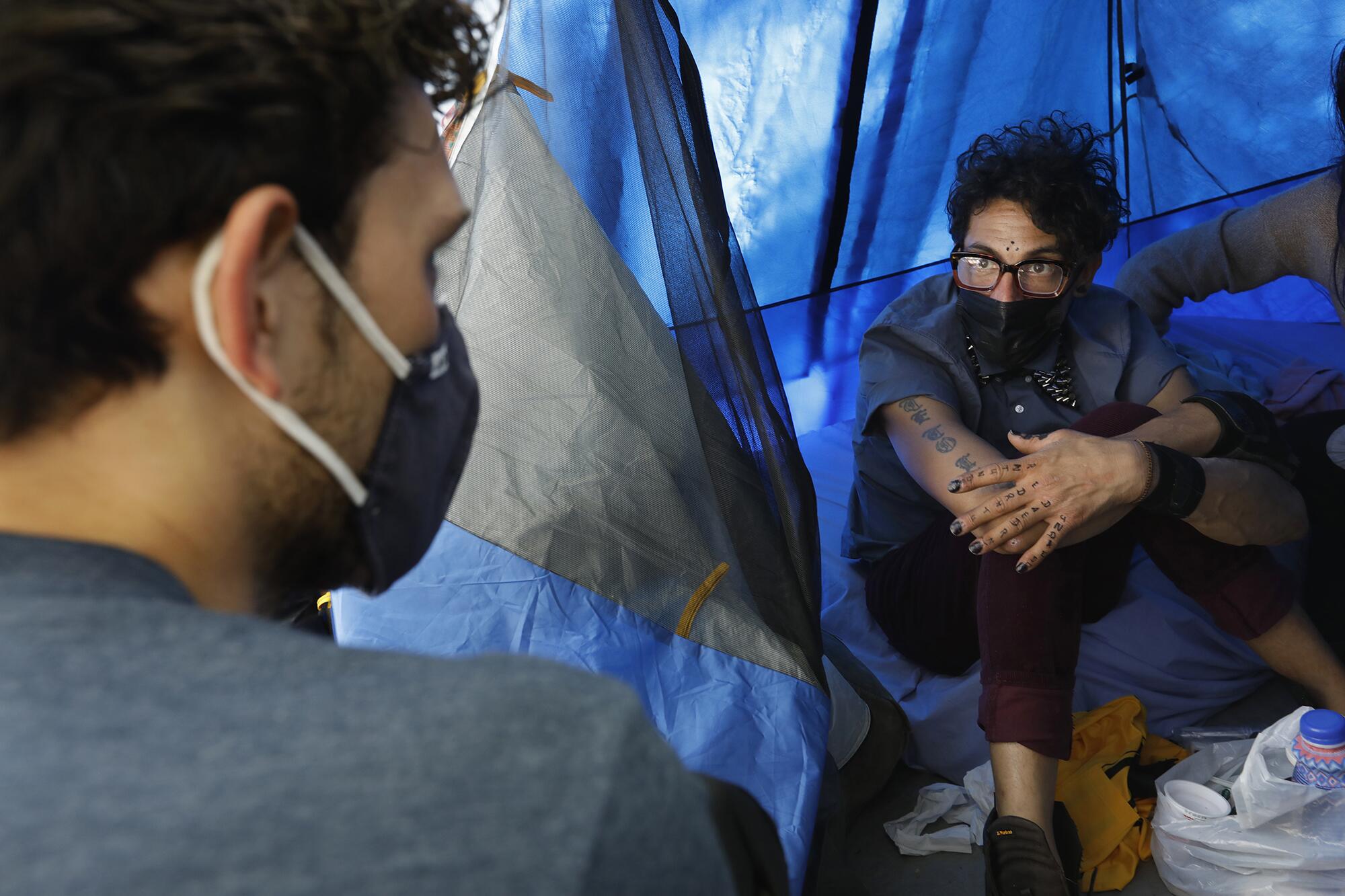
A steel sign posted at the south entrance to the park lists 20 activities that are prohibited. In particular, city ordinance 63.44 prohibits overnight camping in a park. The sign, now covered with graffiti and stickers, is a distant reminder of a $45-million makeover that O’Farrell declared upon its 2013 completion would make the park a “world-class destination.”
It’s a destination rich with L.A. history. The lake was once a movie backdrop for Charlie Chaplin and other Hollywood pioneers, the setting for the temple built by the notorious evangelist Aimee Semple McPherson and the site of Jack Nicholson’s famed boating scene in the movie “Chinatown.” The hills around the lake have been a hot spot for gentrification, as the area transitions from a predominantly blue-collar Latino community, also favored by artists and progressives, to one that’s now sought out by wealthier and whiter individuals.
Searching out key locations in Los Angeles’ history often requires a vivid imagination.
Andrea Martinez, 71, a retired mediator who lives in the Echo Park home she inherited from her grandmother, recalls holding her mom’s hand as she walked beside the lake at age 5.
“I have never seen the lake like that,” she said of its current condition.
She said she hopes for a humane solution but doesn’t think everyone needs help.
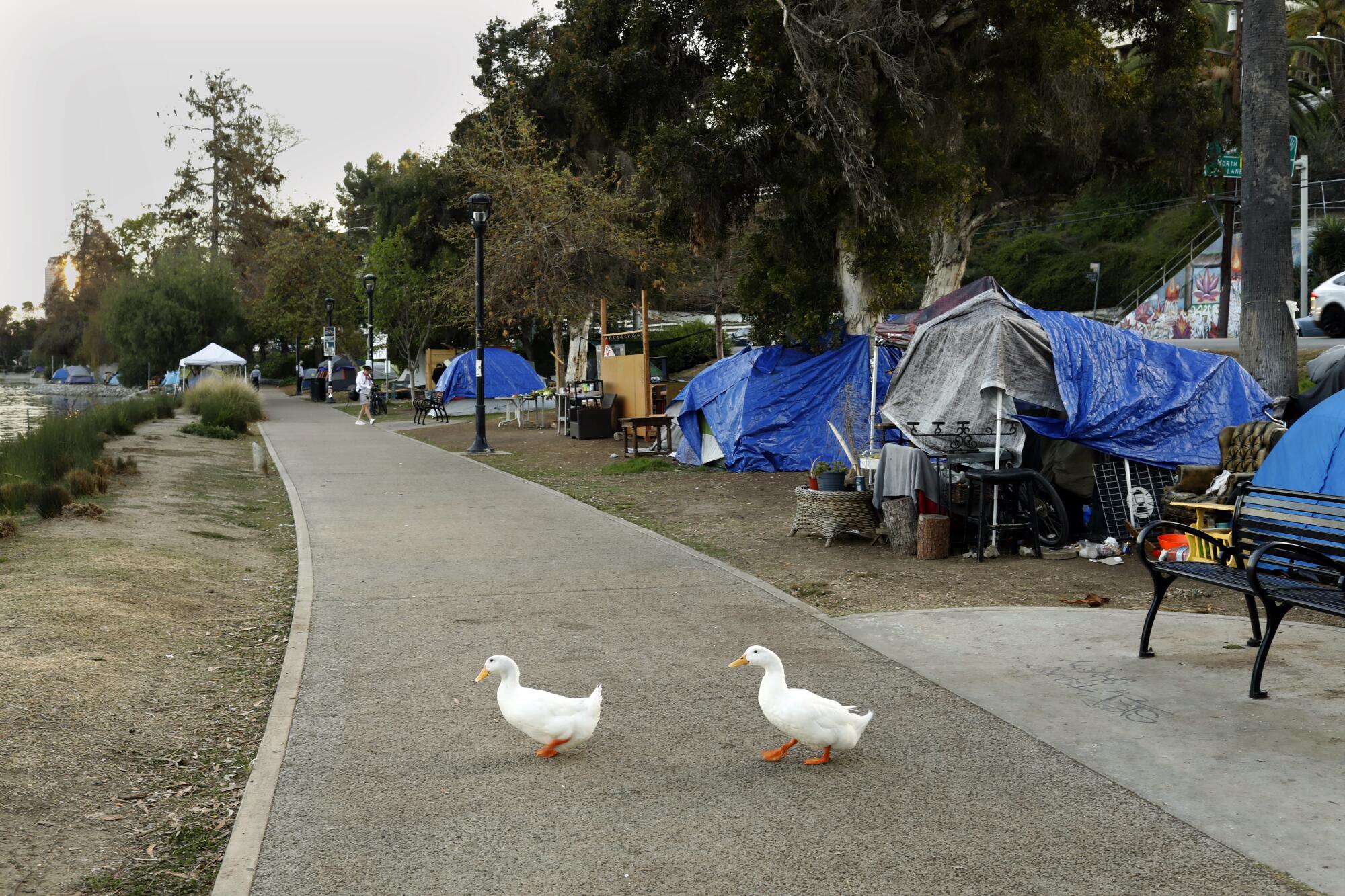
Residents say that for as long as they can remember, the park has always had a few people sleeping on the grass. But overt violation of the ordinance grew exponentially in late 2019. The city’s response — constrained by constitutional and public health considerations — has been a mix of unofficial tolerance and low-key pressure.
In January of last year, police and sanitation crews met resistance from park dwellers and their advocates who protested a cleanup as an attempted eviction.
In a letter to O’Farrell, the “constituents of Echo Park Lake” proposed a “community contract.” They pledged to keep the park clean and be respectful of their housed neighbors. In return, they demanded an end to ticketing, nighttime raids and frequent cleanups.
L.A. County is making the homeless population eligible for vaccination.
Since then, police have kept a hands-off posture. Park rangers have refrained from ticketing but, residents say, intermittently harass them by shutting restrooms, cutting nighttime lighting and denying access to trash bins. In an email, a spokeswoman for the Recreation and Parks Department denied that access to restrooms and trash bins has been blocked and said that “instances of vandalism have required some lighting be secured for safety reasons and if broken is remedied as quickly as possible.”
Encampment residents also say that authorities periodically warned that a clearing of tents in the park was imminent, leaving them to wonder if their days there were numbered. A spokeswoman for the city’s Bureau of Sanitation said it had conducted nine cleanups at the park department’s request in the first half of 2020 and had not been asked since.
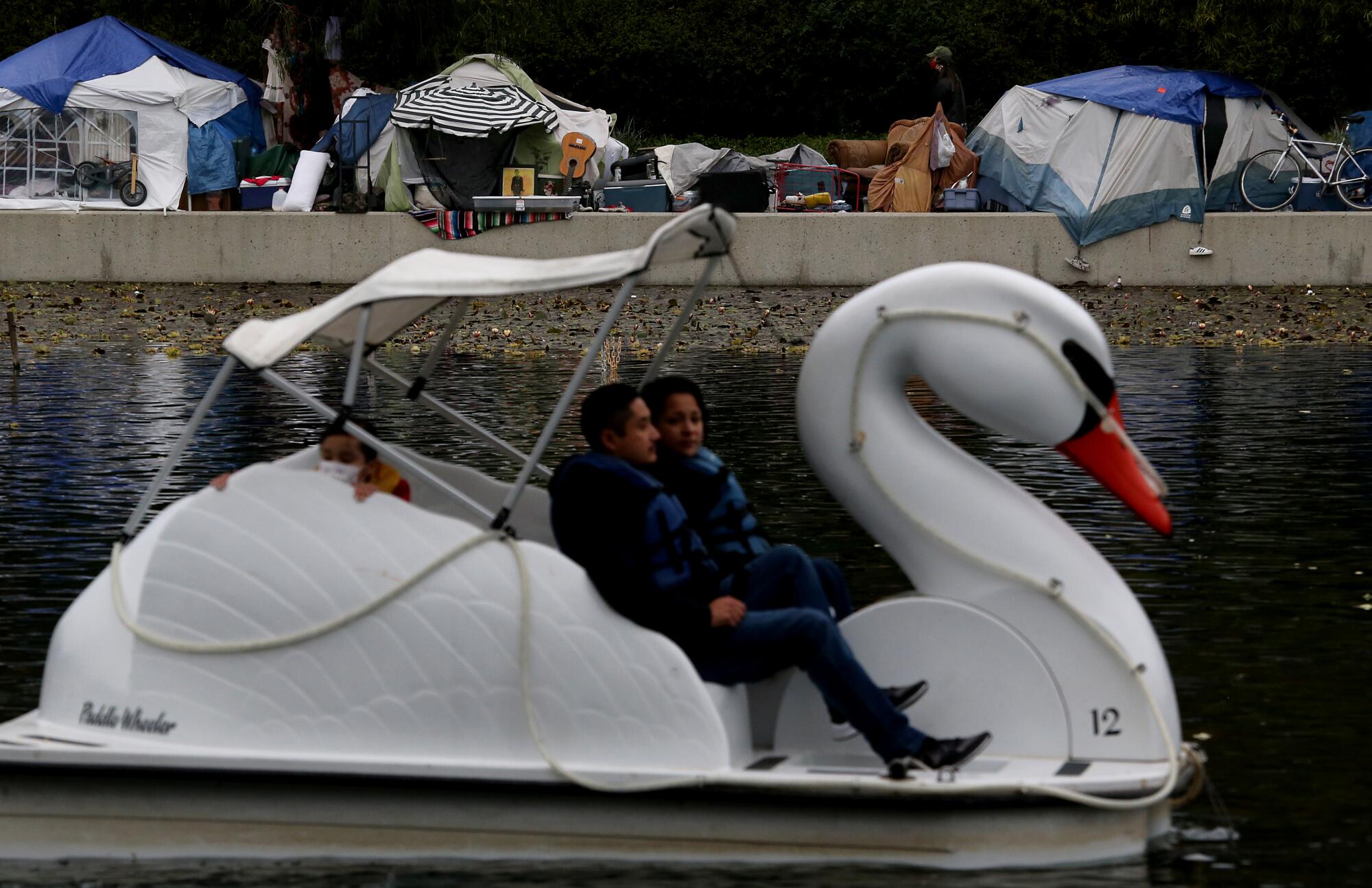
Throughout this uncertainty, park residents, with assistance from volunteer groups, pulled together to adapt, said longtime resident Ayman Ahmed, a 20-something who has become an unofficial spokesman.
Ahmed spent a recent Saturday connecting a battery-powered water pump and heater to the wooden shower stall the community built beside the lake.
His goal, Ahmed said, is to build a community, but not one defined by economic ties.
“Just being here together is community,” he said.
Next, he said, he’ll tackle the communal kitchen, currently not much more than an outdoor pantry for donated goods. “The goal is to make it so nice that the housed and unhoused will use it,” he said.
But the “contract” had little appeal to housed residents who were increasingly annoyed by the multiplying tents and felt threatened by the people living there.
Janette Ramirez, who grew up in Echo Park, said her aunt and uncle had to file two police reports after being accosted by a couple who lived in a van.
“They were telling them to go back to their country,” Ramirez said.
After they filed the first report, the man threatened to kill them.
“They used to cross the park to go to the store on Sunset,” Ramirez said. “They don’t want to go out anymore. They’re traumatized with this incident.”
In February, Riley Montgomery, a 36-year-old documentary filmmaker, posted a petition on Change.org, outlining the residents’ grievances and asking others to join in pressuring public officials to provide housing and remove the tents.
Montgomery said he was motivated by comments of homeless people and their advocates suggesting that the campers had a right to live in the park until everyone was provided permanent housing. He posted a YouTube video portraying several people in the camp harshly as violent and shiftless. He is now making a second video.
Though the petition now has more than 4,300 signatures, Montgomery conceded that it has not produced results. In fact, the tents continued to spread.
By summer, Jeff Giles, a 32-year owner in the crescent-shaped condominium building perched high on the west slope of the canyon — a designated historic structure — got together with a few others to form Friends of Echo Park Lake. Giles wrote a mission statement, similar to Montgomery’s petition, calling for the city to provide housing and restore the park.
Acknowledging that he was politically naive, Giles said he was taken aback by the divisions among his neighbors and the level of hostility.
“There were those that say, ‘Get a bulldozer down there and move those tents out today.’ There were other people saying, ‘I belong to the ACLU, these people have a right to be there.’ And from that moment on, I saw that this was not a simple story,” Giles said.
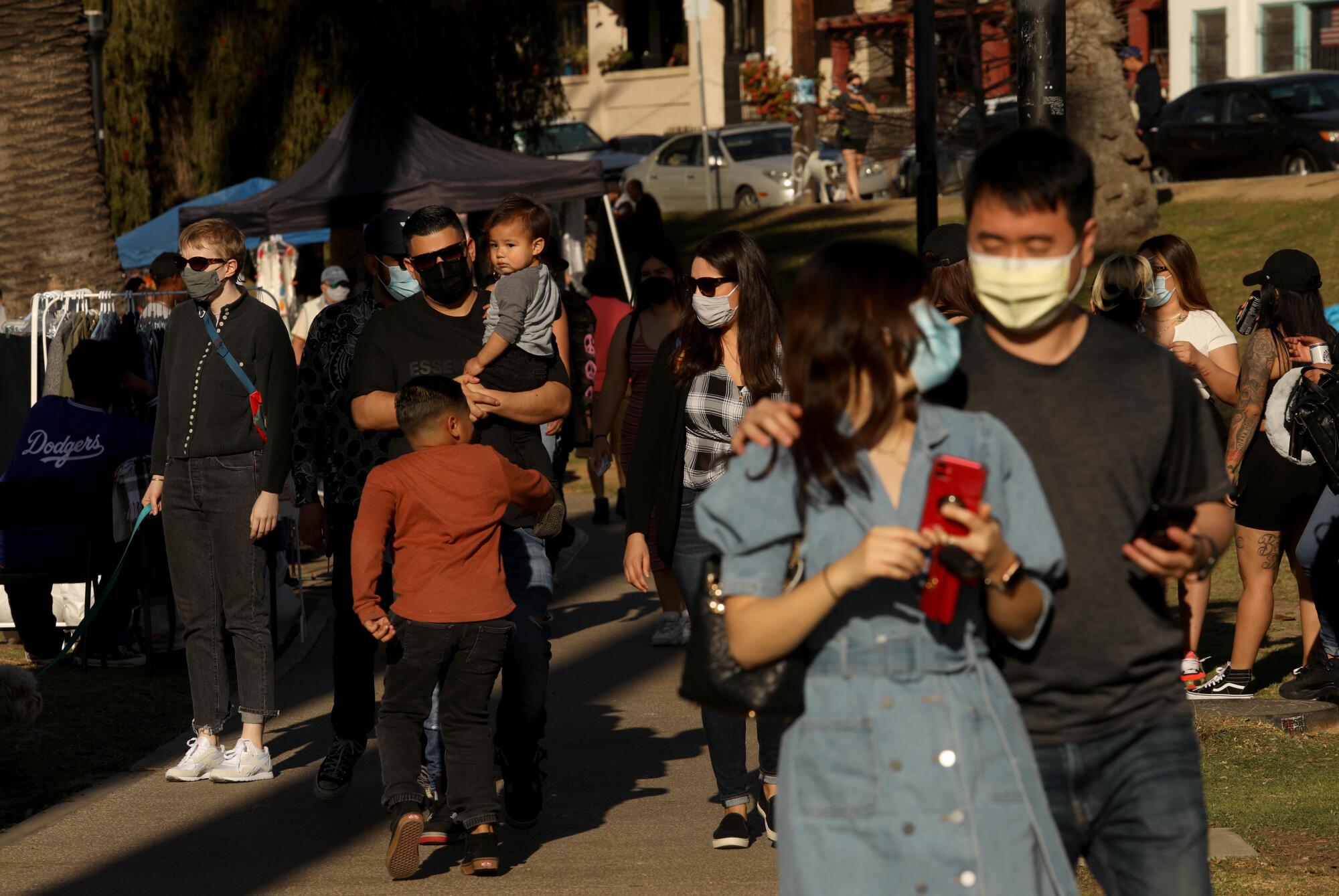
Zoom meetings of the Echo Park Neighborhood Council and L.A. City Council became nasty forums for the competing viewpoints.
Homeless advocates publicly shamed homeowners who pushed for more cleanups in the park.
“I think it’s kind of ridiculous hearing all these people who are in homes safe and warm complain about safety when volunteers are going out and buying tarps and blankets to make sure people don’t die,” a Zoom caller who gave his name only as Lane said during a February meeting of the City Council’s Homelessness and Poverty Committee.
During one community meeting on Zoom, advocates for the encampment residents read out Giles’ address and the value of his condo. And in January, Montgomery showed up at Parriott’s home, a visit the Street Watch organizer thought was threatening but Montgomery said was only to discuss their views.
For all the clashing viewpoints, one common theme dominates the rhetoric over Echo Park Lake. All parties agree that the only viable solution is for all those living in the park to be provided acceptable housing.
What constitutes “acceptable” and how it would be achieved is the wedge that continues to drive both sides apart. For some, acceptable is a “tiny home” — a small house no bigger than some garden sheds — while others say everyone in the park deserves an individual apartment or hotel room.
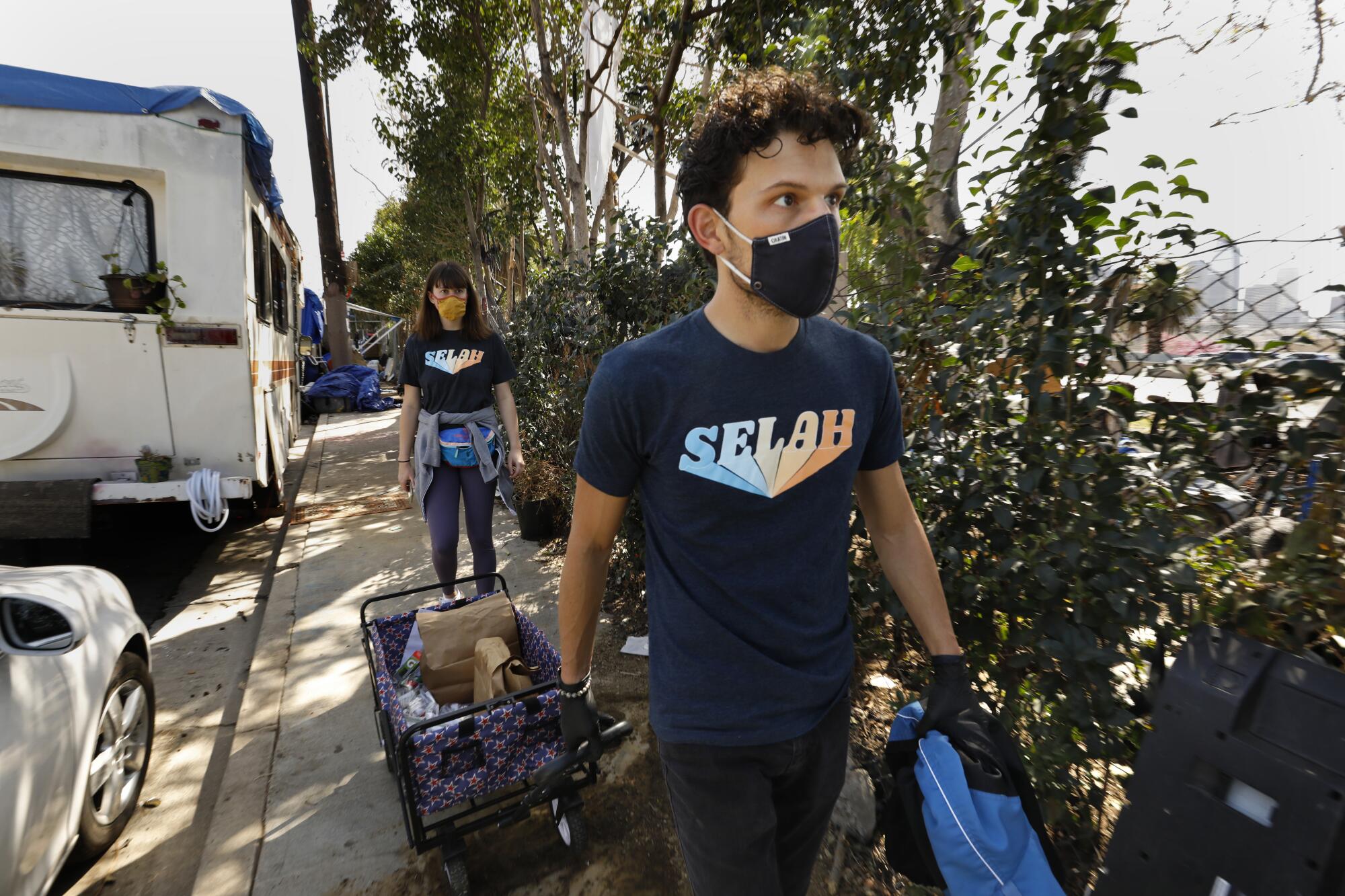
In terms of public access and safety, the reality in the park is nowhere as clear as either side portrays it.
A Times analysis of Los Angeles Police Department records shows that crime increased in 2020.
Burglary was up 50% from the decade average and aggravated assaults up 30%. There were six reports of brandishing a weapon, more than over the entire preceding decade.
Residents and homeless advocates alike are most alarmed by four deaths. Three last summer were drug overdoses, one of the victims a young San Diego native who had come to Los Angeles to participate in protests. In December, the body of a homeless person was found in the lake.
In November, Davon Brown, an early resident who had forged a media presence as a leader in the community, was wounded in a gang-related shooting. He recovered but returned to his home in New York, Parriott said.
Throughout 2020, homeless people were disproportionately the victims of crime. Records provided by the LAPD showed, for example, that of 21 assaults allegedly committed by homeless people in Echo Park, other homeless people were the victims in all but seven. An additional 13 homeless people were victims of assaults allegedly committed by people living outside the park.
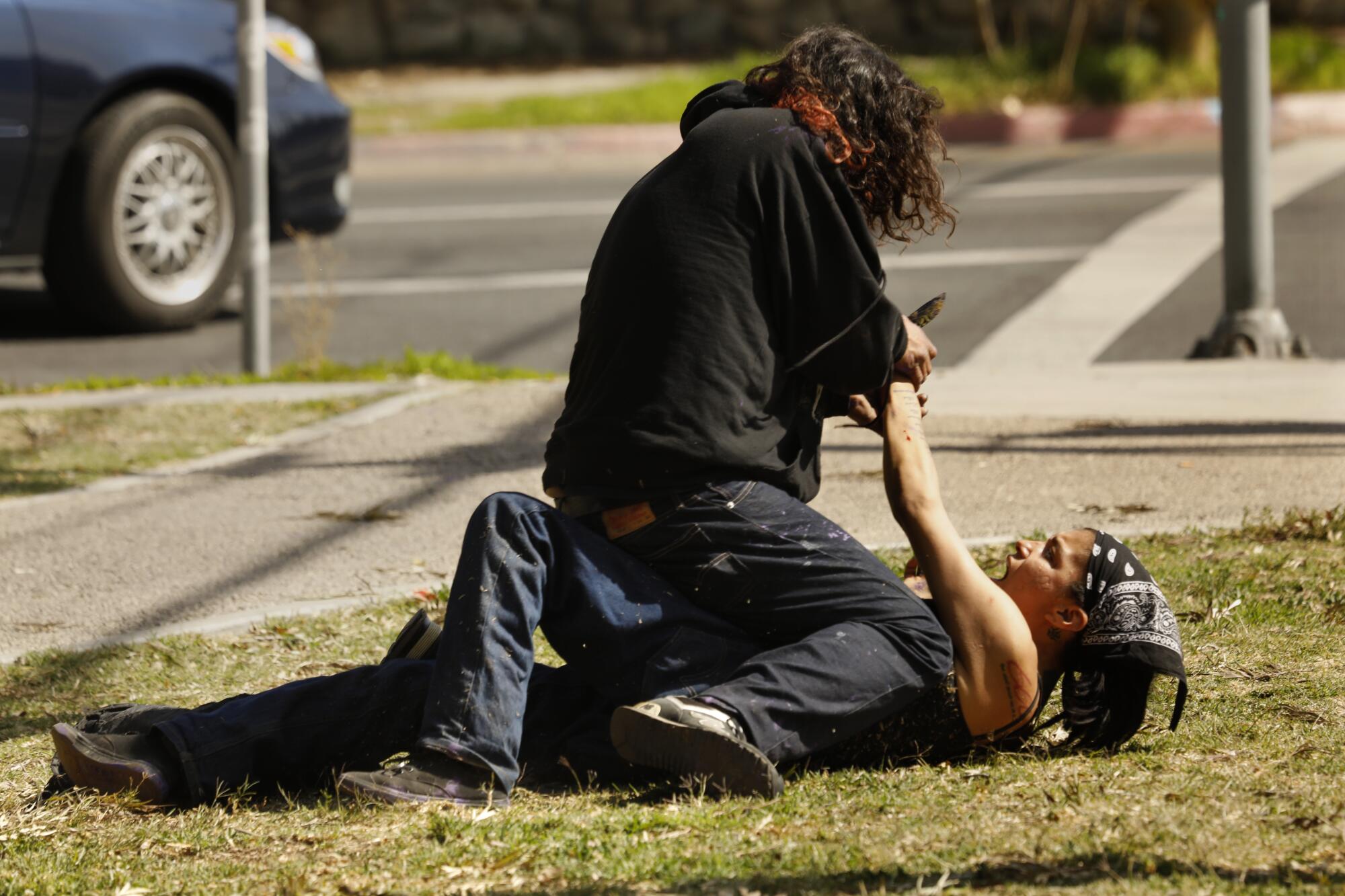
On the southeast side of the park, Brooke M poked her head out of a tent as her friend yelled in frustration while looking for his backpack. Tired eyes hinted at the challenges this 34-year-old wanted to overcome. She’s been trying to shake a fentanyl addiction for the last year and hadn’t expected to stay here so long — after spending all her money on hotel rooms.
She’s leery of going into a government-provided hotel room like the ones that have been offered to some of her friends. They spoke of curfews and how they were sent to skid row. She felt the outreach workers who offered her the room didn’t do enough to placate her concerns.
Staying in the park hadn’t been so bad. There was lots of food and supplies left for the encampment residents, she said. Still, at night it could be scary and she tried to keep to herself as a result, she said.
“There are a lot of people who come and help,” she said. “But there are no locks on the doors here. It’s dangerous.”
Shortly after speaking to Brooke M, a Times photographer witnessed a knife fight between two homeless residents just outside her tent. Four LAPD squad cars rushed to the scene to break up the melee.
Despite the expanse of tents, the park has not lost its appeal to Angelenos of all backgrounds who come to fish, enjoy beers with their friends and listen to music.
On a recent sunny Saturday, dozens of the signature white swan boats dotted the lake. On the eastern shore, where just six tents stand, vendors sold food and handiwork under portable canopies. Hundreds of families and couples convened on the grass, and joggers circumnavigated the lake on paths that have remained unobstructed by tents or debris.
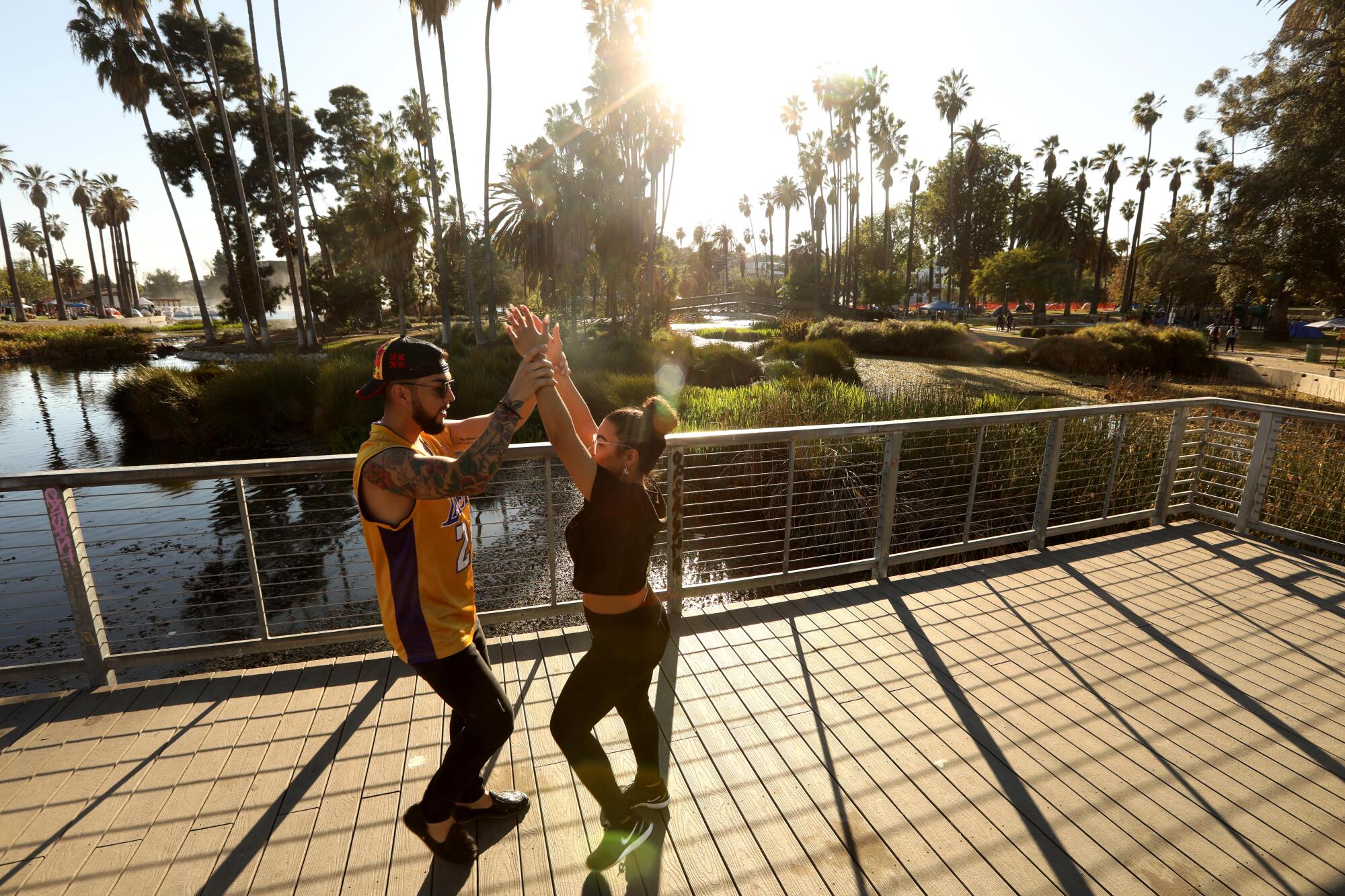
“If I was unhoused, I would rather be here than anyplace else,” said Liam White, a resident of nearby Angelino Heights, who was lounging on the bank with a group of out-of-town friends.
He said the tents made him a little uncomfortable but not unsafe.
“You feel bad for disrupting their lives,” White said. “When people are living here it doesn’t feel as much like a public place as before.”
In a virtual town hall in October, Councilman O’Farrell outlined a bold vision to reconcile the competing interests.
“I have an obligation and a duty to find lodging for everyone who is there,” he said. “The bottom line is, when we get a place for everyone who is there to lodge safely under a roof, then the park will be free and available for everyone to use after we make the repairs.”
Pressed, O’Farrell would not commit to a deadline but said it would be “weeks or a few short months and certainly not to stretch out well into the future or well into 2021.”
As the months stretched out, residents have concluded that promise was hollow.
“Every time I talk to him, he’ll make a promise that almost never happens,” said Montgomery, the petition author.
In a recent telephone interview, O’Farrell reaffirmed his promise to find lodging and said his office had made progress. He cited the purchase of a newly constructed apartment building with 41 units for homeless people and the lease of a parking lot near Echo Park where 38 tiny homes are now under construction. Negotiations are underway to lease a site for what he called a “safe sleep village” for 73 people.
O’Farrell said 56 people had been moved from the lake into shelter since Jan. 1.
As soon as all the people have been moved, the park will be closed for repairs, O’Farrell said.
He did not give a specific date or detail how he planned to remove people who preferred to stay in the park. He said, however, that “everyone who is there will have a much safer environment in which they can live safely.”
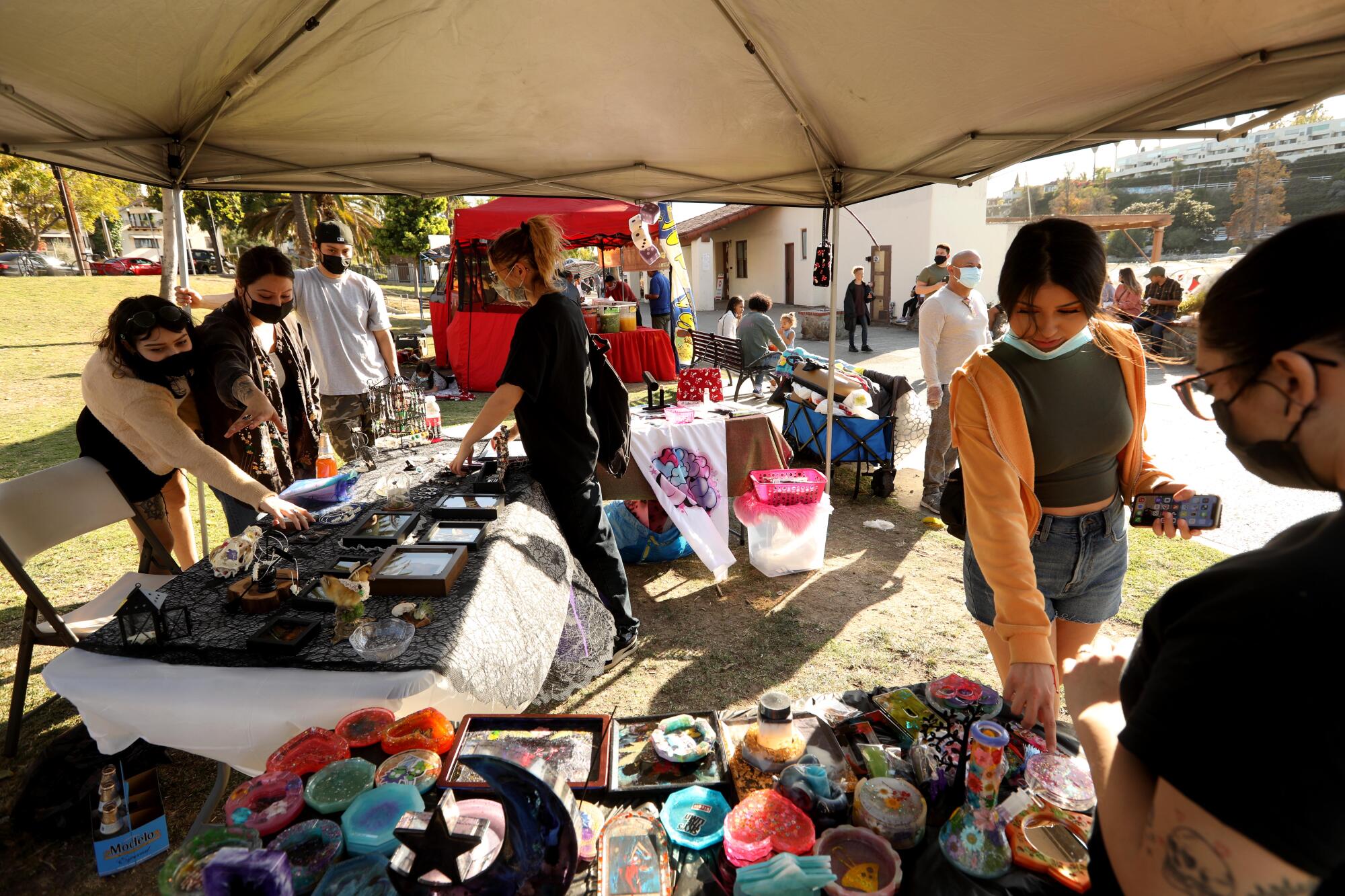
Meanwhile, advocates for the homeless camp have faulted O’Farrell for neglecting the needs of park dwellers.
“The city hasn’t funded a single bottle of water,” said Zarinah Williams, president of the Echo Park Neighborhood Council.
Williams said volunteer groups such as Street Watch and SELAH Neighborhood Homeless Coalition are providing essential services that should be the city’s responsibility. This week, under the name Echo Park Together, several groups posted an online letter addressed to O’Farrell with a list of demands, including permanent housing for every person living at the lake and weekly community meetings to update progress.
While park rangers have at times blocked access to waste bins, SELAH helps residents deal with the most enduring complaint about homeless camps — their trash. Last month it organized an unofficial cleanup. The neighborhood council paid for supplies. As a public service, a city-contracted trash hauler, Universal Waste Systems, set out bins and took away the trash. Camp residents did the labor.
O’Farrell said his office had provided safe storage space, a mobile shower and laundry services and worked to keep restrooms open during the summer.
Urban Alchemy, a nonprofit hired by his office to offer services in the park, has placed 24 residents in the winter shelter program, O’Farrell said.
In addition, the Los Angeles Homeless Services Authority has beefed up its outreach in the park and is encouraging residents to take rooms as they become available in a hotel leased by the city to provide private rooms to homeless people during the pandemic.
LAHSA Executive Director Heidi Marston told The Times that the agency, at the request of Mayor Eric Garcetti, has prioritized park residents for shelter placements but cannot give preference for scarce permanent housing. The agency has placed about 46 people in hotel rooms.
The effect on the number of tents in the park has been minimal, partly because residents sometimes pitch an additional tent or two to store their possessions, others leave their tents behind when they depart, and new arrivals are sometimes given tents or bring ones with them.
“For every person that leaves, another shows up,” said Terrance Wright, a 25-year-old unemployed restaurant worker who has been homeless intermittently since he was 17.
Wright had lived in the park on and off for over a year and left his tent up after he received a room in a hotel recently.
Getting that room was a relief. He said he comes back to hang out during the day for the same reason he was attracted here in the first place: community. His friends stayed here and he knew it was relatively safe.
The COVID-19 pandemic has exacerbated the issue of homelessness in Southern California. We share images reminiscent of the Great Depression.
A tricky legal landscape leaves authorities few tools to remove encampment residents who choose to stay. Court rulings limit the city from fining or arresting someone for sleeping in public if it can’t provide a suitable place for them to sleep. The city is also generally abiding by a Centers for Disease Control and Prevention recommendation against dispersing encampments for fear of spreading COVID-19.
The enduring attraction of the park has convinced Giles, the founder of Friends of Echo Park Lake, that the tents will never leave if the overnight camping law is not enforced.
He doubts there’s the will to do that and acknowledged that his own support for enforcement has softened as his understanding of homelessness has evolved.
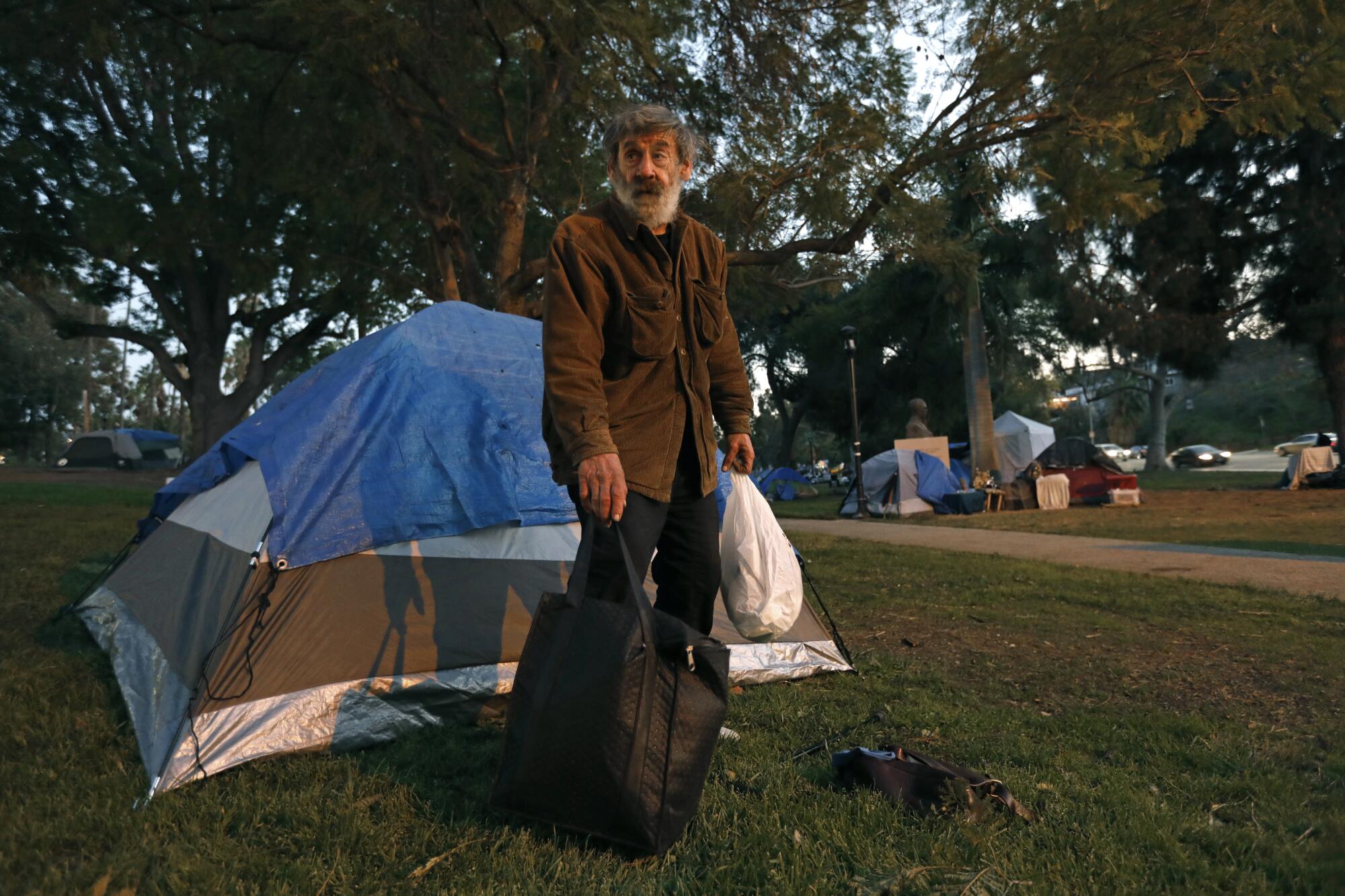
“We did realize that yes, there was a whole humanistic factor that was missing here,” he said.
The inevitable future he now sees is Echo Park Lake’s “fall into ruin.”
On a recent March evening, the water shimmered as lights from the lazily circling swan boats bounced off the lake. Street lamps lit up the boat house and the nearby path. The western side of the park — the “homeless side” as some encampment residents call it — was shrouded in darkness.
The street lamps no longer work.
Two returnees prepared to bed down.
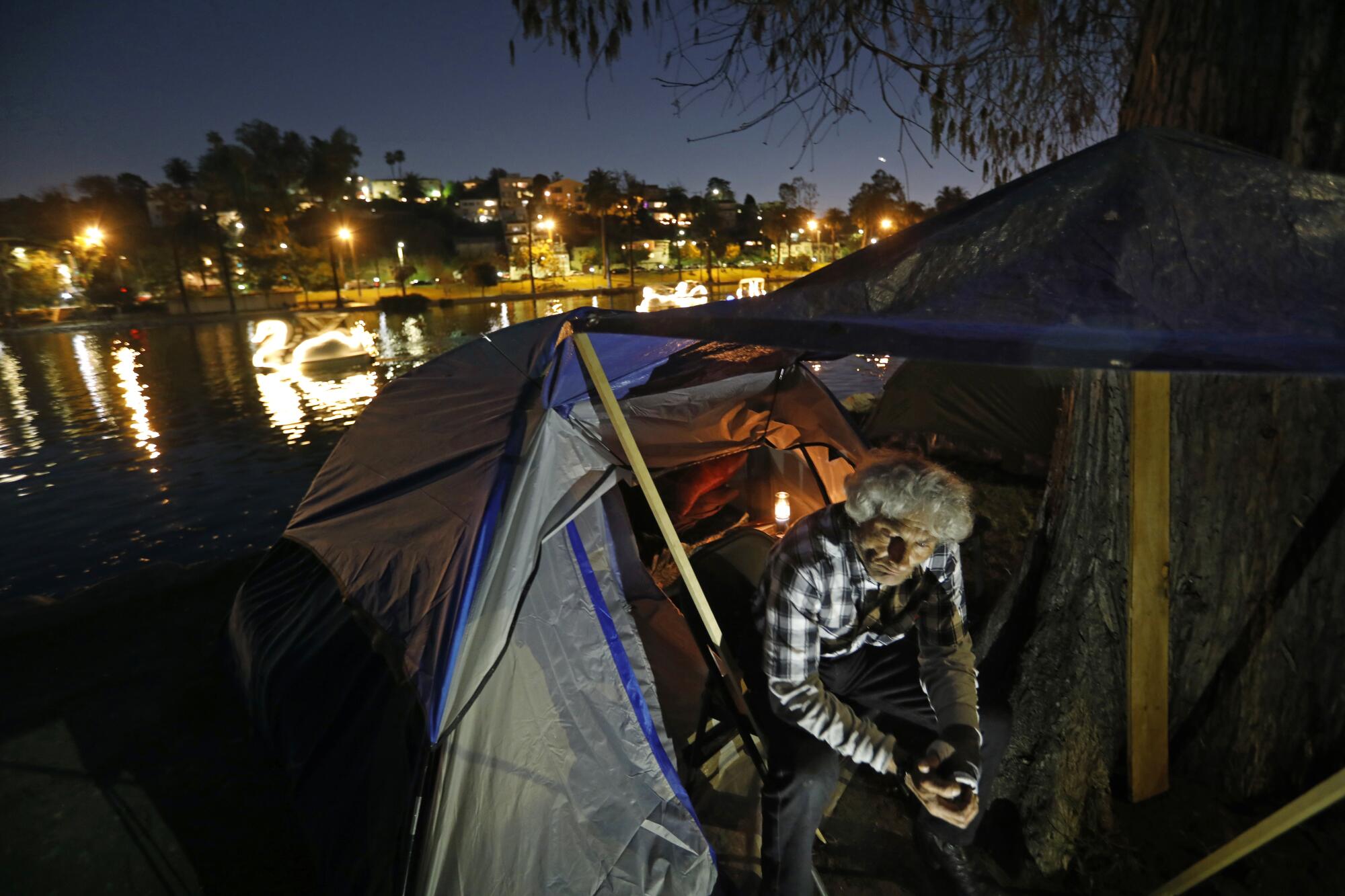
After a fight with his landlord, Frank Chiaro, 71, left behind his furniture and a subsidized studio apartment in MacArthur Park. He still has the rental subsidy and will be looking, he said.
“I’m going to stay here as long as it takes to get me another apartment,” he said.
Down a winding path, with an occasional jogger or couple walking their dog, sat Gene Ostrin outside his recently pitched tent. The 53-year-old said he was “kicked to the curb” by his girlfriend’s son after a fight and stopped off at Big 5 to buy a tent on his way back to the park.
Ostrin receives $900 a month in Social Security but finds the prospect of renting a room on that “daunting.”
“I checked one room on the internet but never got a call back.”
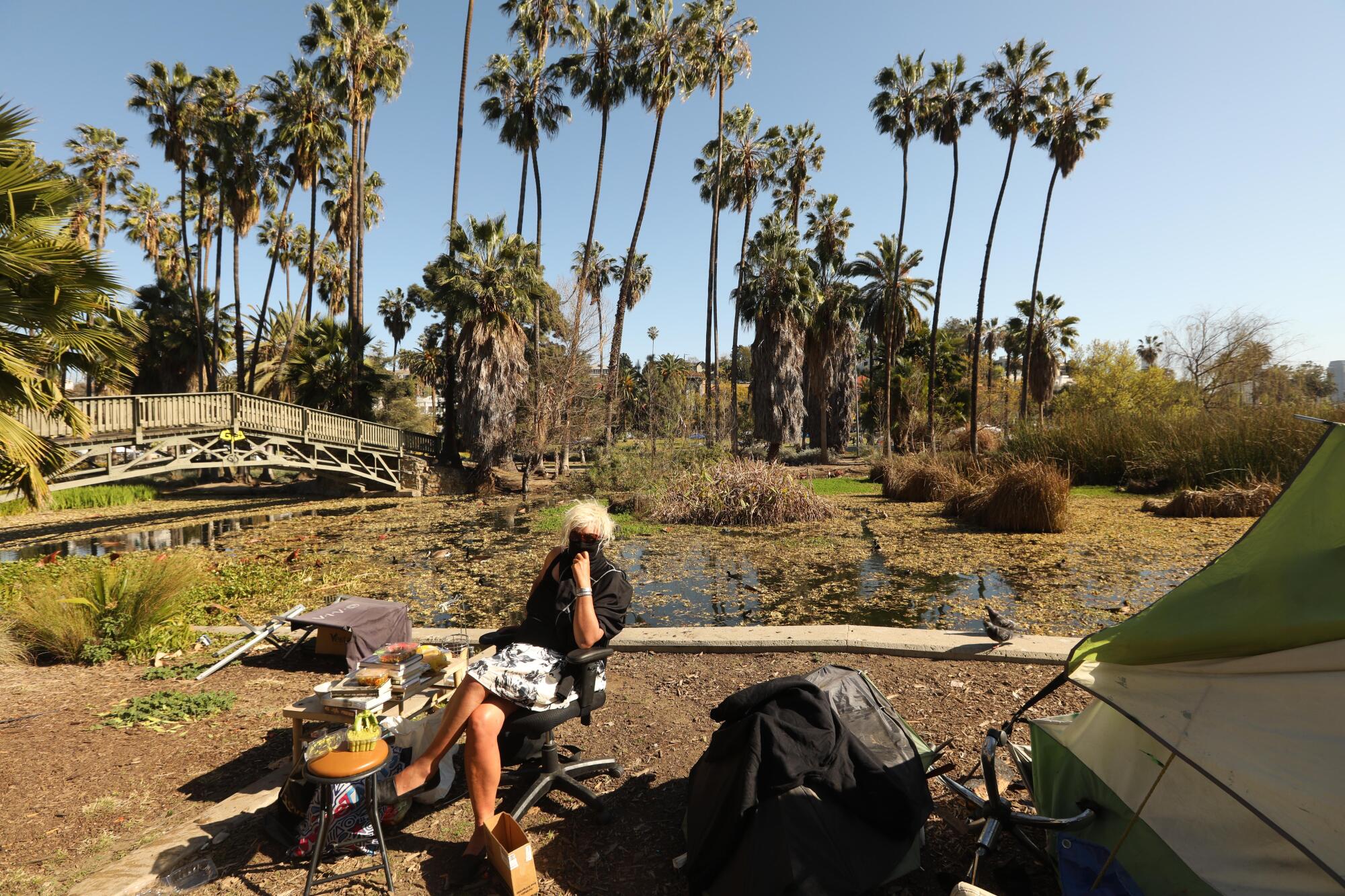
The park itself is an intangible draw for those who have experienced a highway underpass or a shelter on skid row.
Days earlier a woman in sunglasses with bleach blonde hair sat on a lawn chair at the edge of the lake, the geyser fountain rising behind her. She gave her name only as the initials V-ME. Ten days earlier she had left her home of three years in a downtown single room occupancy hotel after being assaulted by a male resident.
The community provided a tent and blankets and all the healthful food she could eat. She said the change has improved her life.
“To have this kind of beauty nearby makes a difference in our lives,” she said.
More to Read
Sign up for Essential California
The most important California stories and recommendations in your inbox every morning.
You may occasionally receive promotional content from the Los Angeles Times.
